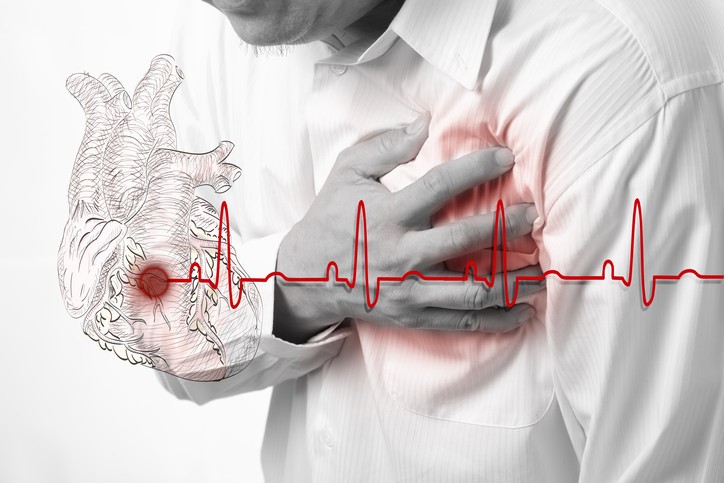
Palpitations: what causes them and what to do
Heart palpitations are a common symptom that can be caused by various health problems. Sometimes, they are the result of a serious heart condition, such as a heart attack or arrhythmia. In other cases, they can be caused by an incorrect lifestyle
However, it is important to know how to recognise them, so that you can understand when it is necessary to seek medical advice.
What are palpitations?
Palpitations (or heart palpitations) are a disorder characterised by the perception that the heart is not beating in the ‘right’ rhythm, but is speeding up.
We speak of heart palpitations both in the case of an increase in heart rate (tachycardia), which can be caused by physical exertion or emotion, and in the case of irregularity of the heart rhythm due to the manifestation of extrasystoles (evoking the sensation of a heart that ‘loses its beat’).
Palpitations can be related to stress, intense physical activity, medication or illness.
As a rule, although they can be frightening, they have no health consequences, and only in rare cases can they indicate an arrhythmia.
What are the symptoms of palpitations?
Palpitations are characterised by:
- a jump in the heartbeat, which gives a sense of shaking in the chest;
- an abnormal rhythm of the heartbeat
- an acceleration of it;
- a completely irregular rhythm.
These sensations can be felt in the throat, neck and generally in the chest, equally at rest or in motion.
If they last only a few seconds, there is usually nothing to worry about.
What are the causes of palpitations?
Among the main organic and non-cardiac causes of palpitations we can indicate
- intense emotional states, due to anxiety, stress or panic attacks;
- excessive physical activity;
- psychostimulant substances such as nicotine or caffeine;
- the use of pseudoephedrine nasal decongestants;
- fever;
- hormonal changes due to menstrual cycle, pregnancy or menopause;
- high or low levels of thyroid hormones;
- hyperthyroidism.
The main risk factors that can cause palpitations include:
- stress;
- anxiety, depression and panic attacks;
- pregnancy;
- use of psychostimulant drugs;
- heart disease, with arrhythmia or impairment of cardiac function.
Palpitations: when to make a cardiological examination?
If palpitations are felt with increasing frequency, they could indicate heart distress and it is therefore a good idea to have an arrhythmologically directed cardiological examination.
In particular, the following are signs that should not be underestimated
- chest pain;
- fainting;
- shortness of breath and wheezing;
- feeling of dizziness or vertigo.
Palpitations: what tests to do for diagnosis?
If the doctor suspects that the cause is related to a heart ailment, he or she may prescribe certain tests, such as:
- The electrocardiogram (ECG) detects the electrical impulses generated by the heartbeat through sensors applied to the chest, in order to detect abnormalities that could explain the occurrence of palpitations.
- The cardiac holter (or dynamic electrocardiogram) requires the application of electrodes on the chest connected to a portable device that monitors the functioning of the heart for 24-72 hours.
- The event recorder, on the other hand, is the recording of the electrocardiographic trace that monitors the heart rhythm through the implantation of a small battery-operated device. The examination is prescribed when arrhythmias are not constant, but discontinuous (e.g. they only appear once a week).
- The echocardiogram uses ultrasound to understand whether the heart has abnormalities in the ventricles or valves.
Can they be prevented?
The most effective way to prevent, or contain the risk of, palpitations is to follow a few steps:
- try to relieve stress, through meditation techniques, deep breathing, exercise;
- avoid caffeine and energy drinks, which can accelerate the heartbeat;
- if prescribed by your doctor, use anxiolytics;
- avoid taking drugs.
What can be behind palpitations?
Heart palpitations or palpitations can therefore hide cardiac arrhythmias that if not intercepted in the short term by the cardiologist can lead to syncopes or cardiac arrhythmias such as atrial fibrillation, ventricular tachycardia or ventricular extrasystole.
Atrial fibrillation is undoubtedly the most frequent arrhythmia in the general population (estimated at 2-3 %). It is characterised by an irregular heartbeat and if not diagnosed in time can also cause ischemic stroke.
Ventricular extrasystole, on the other hand, is characterised by an extra beat, which is generally benign but can lead to structural cardiomyopathy in a minority of cases.
Ventricular tachycardia is a very dangerous re-entry arrhythmia, usually associated with a previous myocardial infarction or dilatation of a ventricle.
The 24-hour Holter ECG is usually sufficient to make the diagnosis.
Read Also:
Emergency Live Even More…Live: Download The New Free App Of Your Newspaper For IOS And Android
What Are The Risks Of WPW (Wolff-Parkinson-White) Syndrome
Heart Failure: Symptoms And Possible Treatments
What Is Heart Failure And How Can It Be Recognised?
Inflammations Of The Heart: Myocarditis, Infective Endocarditis And Pericarditis
Quickly Finding – And Treating – The Cause Of A Stroke May Prevent More: New Guidelines
Atrial Fibrillation: Symptoms To Watch Out For
Wolff-Parkinson-White Syndrome: What It Is And How To Treat It
Do You Have Episodes Of Sudden Tachycardia? You May Suffer From Wolff-Parkinson-White Syndrome (WPW)
Heart: What Is A Heart Attack And How Do We Intervene?
Do You Have Heart Palpitations? Here Is What They Are And What They Indicate


